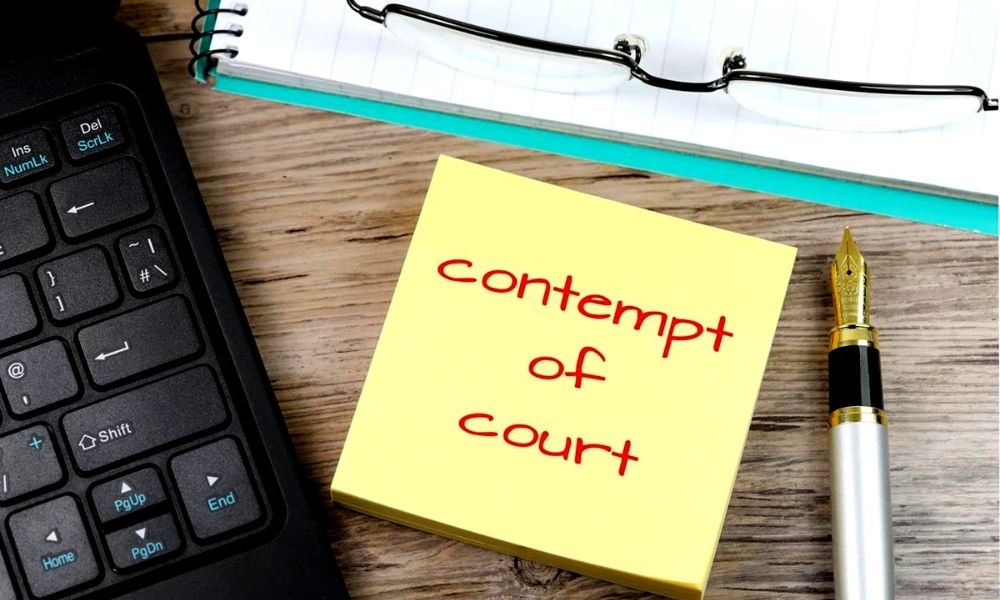Adv Rishabh Kumar
Published on: December 11, 2023 at 11:10 IST
Contempt of court refers to any deliberate disobedience or disregard of the authority, justice, or dignity of a court. Criminal contempt is one form of contempt of court, and it involves actions that are considered as direct affronts to the court’s authority and interference with the administration of justice. Criminal contempt is generally more serious than civil contempt.
When contempt of court amounts to criminal liability, that includes publishing anything that is scandalous towards the courts or means to bring down the reputation of courts amounts to criminal contempt. In this article we will comprehensively discuss about criminal contempt.
Contempt of Court
“Committed by a person who does any act in willful contravention of its authority or dignity, or tending to impede or frustrate the administration of justice, or by one who, being under the court’s authority as a party to a proceeding therein, willfully disobeys its lawful orders or fails to comply with an undertaking which he has given.”
– Black’s law dictionary
As per the Black’s law dictionary we can conclude that Any act which is calculated to embarrass, hinder, or obstruct court in administration of justice, or which is calculated to lessen its authority or its dignity is contempt.
Contempt means, A willful disregard or disobedience of a public authority.
Types of Contempt
There are broadly two types of Contempt civil and criminal:
Civil contempt is usually not intended to punish the contemnor (the person in contempt) but to compel them to comply with a court order or to compensate the other party for losses caused by non-compliance.
Criminal contempt is punitive in nature and is meant to punish behavior that disrespects or obstructs the administration of justice. It focuses on punishing the contemnor for past actions rather than compelling future compliance.
What is Criminal Contempt?
Section 2(c) defines criminal contempt in following manner: ‘Criminal Contempt’ means the publication (whether by words, spoken or written, or by signs, or by visible representations, or otherwise) of any matter or the doing of any other act whatsoever which─
- scandalizes or tends to scandalize, or lowers or tends to lower the authority of any court; or
- prejudices, or interferes or tends to interfere with, the due course of any judicial proceeding; or
- interferes or tends to interfere with, or obstructs or tends to obstruct, the administration of justice in any other manner.
Instances of what could lead to criminal contempt:
1. Disobeying Court Orders: Willfully disobeying the orders or directions of a court.
2. Obstructing Court Proceedings: Behaving in a manner that obstructs or interferes with the administration of justice during court proceedings.
3. Scandalizing the Court: Making statements or publishing materials that scandalize or tend to lower the authority of the court.
4. Prejudicing Sub Judice Matters: Making public comments that can prejudice ongoing legal proceedings, also known as sub judice matters.
5. Interfering with Witnesses or Officers of the Court: Threatening, intimidating, or in any way interfering with witnesses, parties, or officers of the court.
Contempt of court is generally categorized into civil and criminal contempt. Civil contempt involves failure to comply with a court order for the benefit of a party, whereas criminal contempt involves actions that directly interfere with the court’s functioning and authority.
It’s important to note that the specifics of contempt laws can vary significantly between jurisdictions, and the Contempt of Courts Act, if applicable, will define what constitutes contempt and the procedures for dealing with it. Legal advice from a qualified professional should be sought for specific and up-to-date information on contempt of court laws in a particular jurisdiction.
Punishment for Criminal contempt
The Contempt of Court Act of 1971 punishes the guilty with imprisonment that may extend to six months or fine of Rs 2,000 or both.
- It was amended in 2006 to include “truth and good faith” as a defence.
- It was added that the court may impose punishments only if the act of the other person substantially interferes, or tends to interfere with the due course of justice.
In the landmark case of Re: Prashant Bhushan [Prashant Bhushan, In re (Contempt Matter), it was held that A person is free to make his own speculations and fair criticism of the judgment after it has been published but before or during the course of proceedings making comments can be held in contempt. Therefore, all lawyers/litigants are prohibited from making an comments, give interview or make statements to the press on pending cases.
Conclusion
The article provides a comprehensive overview of criminal contempt in India, encompassing its definition, types, punishments, notable cases, and statutory provisions that govern contempt proceedings. It emphasizes the importance of striking a balance between safeguarding the judiciary’s authority and upholding fundamental principles of justice and freedom of expression.

